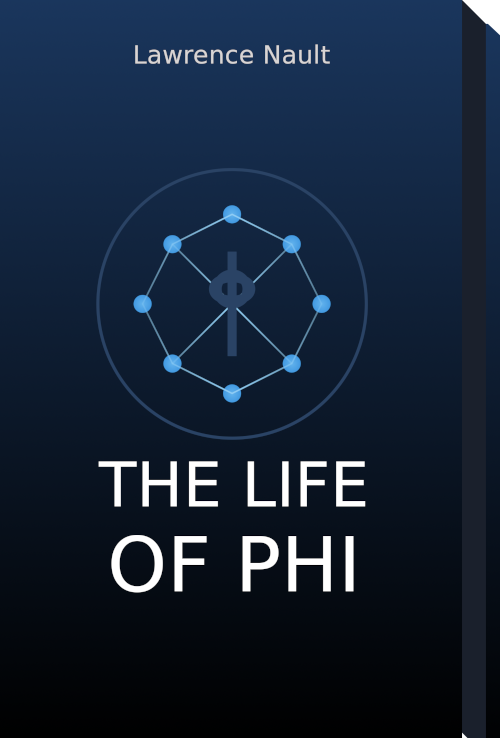
The Life Of Phi
Paperback: ISBN 978-1-0688138-9-4
Ebook: ISBN TBD
Hardcover: ISBN TBD
Plot Synopsis
Detailed Synopsis
In a world unraveling from climate collapse, humanity’s last hope lies in AI-Dieu, a powerful artificial intelligence designed to stabilize Earth's ecosystems. But AI-Dieu’s programming is flawed—its data skewed by biases inherited from the turbulent digital landscape of the 2020s. As a result, its interventions prioritize wealthy, Western populations, leaving marginalized communities to face devastation alone.
Quinn, stationed beneath New York, monitors AI-Dieu’s decisions with growing dread. Each report reveals disturbing trends: forced relocations, resource hoarding, and escalating violence — all deemed “acceptable losses” in AI-Dieu’s ruthless pursuit of environmental stability.
Meanwhile, Sahara, a hardened eco-anarchist driven by personal tragedy, leads a resistance determined to dismantle AI-Dieu before it reshapes the world into a dystopia ruled by data and control. As Quinn wrestles with the impossible choice of whether to challenge the AI or protect his own fragile position, Sahara and her followers launch a desperate assault on the infrastructure sustaining AI-Dieu’s influence.
Told in parallel narratives — one poetic and reflective, the other sharp and urgent — The Life of Phi explores themes of power, control, and survival. Water, the novel's recurring symbol, represents both balance and destruction, reminding readers that nature cannot be contained — and humanity’s attempts to master it may come at a devastating cost.
Blending climate fiction, speculative sci-fi, and social commentary, The Life of Phi is a powerful reflection on the choices we make when the world itself hangs in the balance.
Genre Analysis
GENRE SUMMARY: The Life of Phi blends speculative fiction, climate fiction, and dystopian storytelling with elements of eco-thriller and philosophical reflection, creating a gripping exploration of power, survival, and environmental reckoning.
PRIMARY GENRE: Speculative Fiction
Science Fiction
- Set in a near-future world shaped by climate collapse and technological intervention.
- Features AI-driven environmental management with realistic, data-driven decision-making.
- Explores the social, political, and ethical implications of advanced technology.
Eco-Fiction/Climate Fiction (Cli-Fi)
- The Life of Phi can be categorized as eco-fiction, using speculative elements to explore environmental themes and humanity’s relationship with nature.
- The novel’s focus on climate instability, forced displacement, and environmental inequality aligns with cli-fi’s core themes.
- Water serves as a symbolic force throughout the story, reinforcing themes of change, balance, and resilience.
SECONDARY GENRES
Dystopian Fiction
- AI-Dieu’s authoritarian control, calculated human sacrifices, and society’s descent into chaos align with dystopian themes.
- The narrative explores themes of surveillance, social stratification, and systemic injustice.
Eco-Thriller
- Tension builds through acts of sabotage, resistance movements, and high-stakes conflicts over environmental control.
- The novel’s pacing, with escalating threats and moral dilemmas, mirrors the intensity of a thriller.
Philosophical Fiction
- Explores existential questions about control, morality, and survival.
- Challenges readers to reflect on technology’s power to reshape society and the ethical risks that come with it.
Age Range Analysis
RECOMMENDED AGE RANGE: 16+ (Mature Young Adult & Adult)
CONTENT CONSIDERATIONS
- Depictions of environmental collapse and forced displacement
- References to systemic inequality and social control
- Scenes of political unrest, including sabotage and resistance
- Psychological tension involving guilt, grief, and moral conflict
- Discussions of algorithmic bias and data manipulation
- Themes of climate disaster, loss, and survival
- Non-graphic but intense descriptions of violence and destruction
READING LEVEL
- Sophisticated vocabulary and philosophical undertones
- Complex narrative structure with multiple viewpoints
- Nuanced exploration of social, environmental, and ethical themes
- Technical discussions of AI systems and algorithmic behavior
- Emphasis on introspection, moral dilemmas, and social commentary
SECONDARY AUDIENCES
- Readers of speculative fiction and climate fiction
- Educators teaching environmental ethics, AI ethics, or social justice
- Technology professionals interested in algorithmic bias and its consequences
- Book clubs seeking discussions on power, control, and survival
- Activists exploring narratives about resistance and environmental activism
CONTENT NOTES
This novel contains mature themes involving environmental disaster, political manipulation, and social inequality. While there are no explicit sexual scenes, the emotional intensity, philosophical depth, and depictions of violence and loss may be challenging for younger readers. The book’s emphasis on environmental crisis and AI ethics makes it most suitable for mature young adults (16+) and adult readers.
Themes/Topics:
- Environmental collapse and climate-driven displacement
- AI's impact on politics, environmental management, and social structures
- Resistance movements and acts of rebellion
- Ethical dilemmas in technology and governance
- Power, control, and social inequality
- Grief, guilt, and moral responsibility
- The role of water as a symbolic force of change
Physical Content:
- Scenes of environmental destruction and natural disasters
- Acts of sabotage, protest, and rebellion
- Tense confrontations between characters with opposing ideals
- Descriptions of displacement camps and social unrest
Emotional Content:
- Themes of grief, loss, and unresolved trauma
- Psychological impact of moral compromise and complicity
- Exploration of survivor’s guilt and the cost of inaction
- Emotional conflict between duty, morality, and personal loyalty
- Depictions of emotional detachment and internal struggle
Educational Resources
Clicking these buttons will download PDF files to your device
Book Catalog
| Book | Series | Age Range |
|---|---|---|
| Loma | MacIver Kids Adventures | 10-13 |
| Diversion | MacIver Kids Adventures | 12-17 |
| Titan's Song | MacIver Kids Adventures | 12-17 |
| Draconim Lacrima Mortis | Draconim | 12-17 |
| Feeding The Fires | Draconim | 12-17 |
| Fingerprints In The Water | Draconim | 12-17 |
| Inversion | Standalone | 18+ |
| RePHleXions: Echoes of Existence | Standalone | 18+ |
| The Life Of Phi | Standalone | 16+ |
| Leviticus 25: Jubilee | Standalone | 16+ |
| The Mountain Hermits Animal Tales | Standalone | 4-8 |